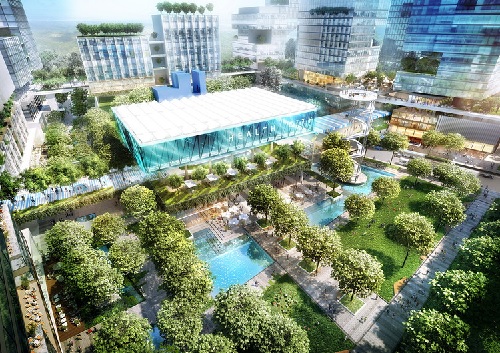
BY EPHREM ANDARGACHEW
According to the World Bank, today, some 55 percent of the world’s population with the equivalent of 4.2 billion inhabitants live in cities. This trend is expected to continue. By 2050, with the urban population more than doubling its current size, nearly 7 of 10 people in the world will live in cities.
More than 80 percent of global GDP is generated in cities. Urbanization can contribute to sustainable growth if managed well by increasing productivity, allowing innovation and new ideas to emerge. Whereas, the speed and scale of urbanization bring challenges such as meeting accelerated demand for affordable housing, well-connected transport systems and other infrastructure, basic services, as well as jobs, particularly for the nearly 1 billion urban poor who live in informal settlements to be near opportunities. Conflicts are on the rise, resulting in 60 percent of forcibly displaced people living in urban areas.
Ethiopia is still predominantly a rural country and 80 percent of the population live in the countryside. Hence, about 20 percent of the population are living in urban areas. According to the Ethiopian Central Statistics Agency figures, the Ethiopian urban population is will be triple to 42.3 million by 2037 and growing at 3.8 percent a year.
The rate of urbanization in Ethiopia will be even expected faster at about 5.4 percent a year. That would mean a tripling of the urban population even earlier by 2034. Therefore, from the total population of the country, about 30 percent will be transformed into urban areas by 2028. This is set to change dramatically along with challenges. Because with the expansion of urbanization some major health problems resulting from urbanization include poor nutrition, pollution-related health conditions and communicable diseases, poor sanitation and housing conditions have been observed. Besides, the issue of the rural-urban or urban-urban movement has caused a number of problems namely poverty, squatter settlements, unemployment, air and noise pollutions, new slums and overpopulation.
Cognizant of this, Ethiopians has been taking different mechanisms to make cities convenient, beautiful and interesting for their residents. Ethiopian Ministry of Health, Minister Dr. Lia Tadesse told local media that making cities comfy and beautiful to its resident has been given due attention. Because, the expansion of cities, settlements, the growing number of residents in the cities, people way of life, industries wastages and construction activities need new approaches. So, numerous insights into waste disposal, solid waste collection, disposal and reuse have been made. Hence, encouraging results have been gained so far.
Environment, Forest and Climate Change Commission, Commissioner, Prof. Fekadu Beyene in his part said that efforts are being made to make the cities more accessible to residents by assessing and auditing environmental negative impacts. Currently, data indicate that there is greater awareness of how to dispose of solid and liquid wastes.
Because wastages are resources that could be used for power generation and compost. So, it is important to sort out waste properly.
Ethiopian Ministry of Water, Irrigation and Electricity Minister Dr. Eng. Seleshi Bekele said that a total of 9,471 new drinking water facilities have been completed in the 2013 Ethiopian budget year with 2.5 million rural and 1.5 million urban residents. This effort has to be improved and fasten to provide drinking water and sanitation to all citizens by 2030 and to achieve sustainable development goals. Because cities are where they can build a better future for the coming generation.
Ethiopian Ministry of Urban Development and Construction Minster Aisha Mohammed elucidate “in this budget year, we have implemented effective job creation and food security programs. In particular, our food security program has been expanded from 11 cities into 83 cities”.
Much work has been done in support of citizens who are unable to work due to unemployment and lack of income in the 83 cities is noteworthy. Besides, various measures and solutions have been prepared to solve the problems of the municipalities, she added.
According to the World Bank Org. if Ethiopia is able to manage the growth and the expansion of urbanization, it is important for economic growth, improving quality of life and reducing poverty. Because urbanization in Ethiopia has been linked with high levels of economic growth, and living standards. Besides, cities contribute 38 percent of gross domestic product (GDP) with only 15 percent of the total workforce.
However, there are trends that could undermine the urban transition and lock in potential negative impacts of urbanization for decades to come if national and local leaders do not take action. Urbanization is failing to meet the demands of growing numbers of urban residents in three areas: access to jobs, infrastructure and services, and housing.
Ministry of Urban Development and Construction State Minister Mihret Minasib remarks that urban institutional and infrastructure expansion programs are being developed to make cities more conducive to their residents. To make the program more effective, a focus must be given to coordination. Sustainable development in cities can only be achieved when cities can increase their internal capacity and income. To this end, cities need to work vigorously on their revenue collection systems. Cities should identify and use their resources wisely, adding that cities should take the lead in all urban development activities to make urban projects effective.
Addis Ababa City Administration Deputy Mayor, Adanech Abebie in her part noted that everybody must be an ambassador of his/her city. Apart from providing and implementing big infrastructure projects and facilities, our cities must promote peace, unity, solidarity, togetherness and love. This will help bring sustainable and comprehensive development.
According to Aisha, green fingerprinting activities are very important in making the cities more accessible to the residents. She also called on the city communities to plant and care for seedlings in the yard, in schools, in religious institutions and so on.
The Ethiopian Herald August 22/2021




